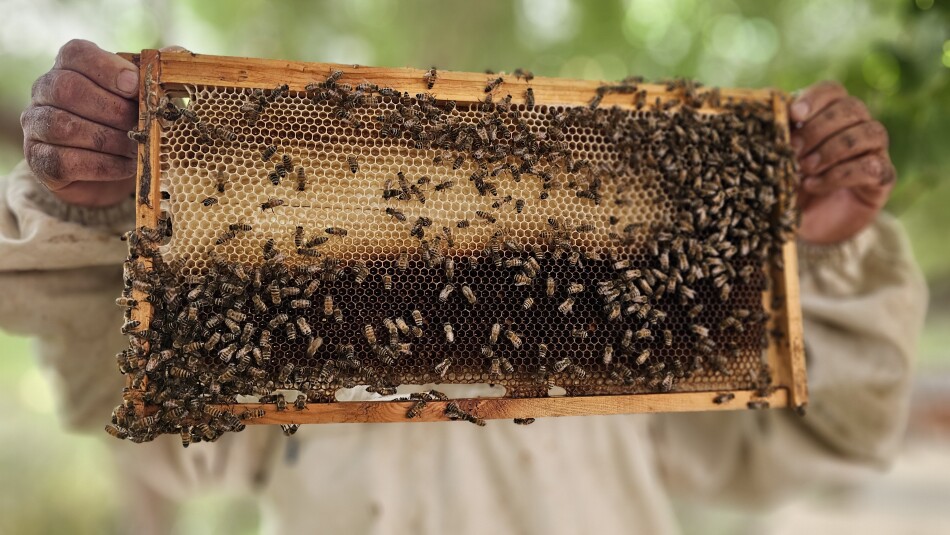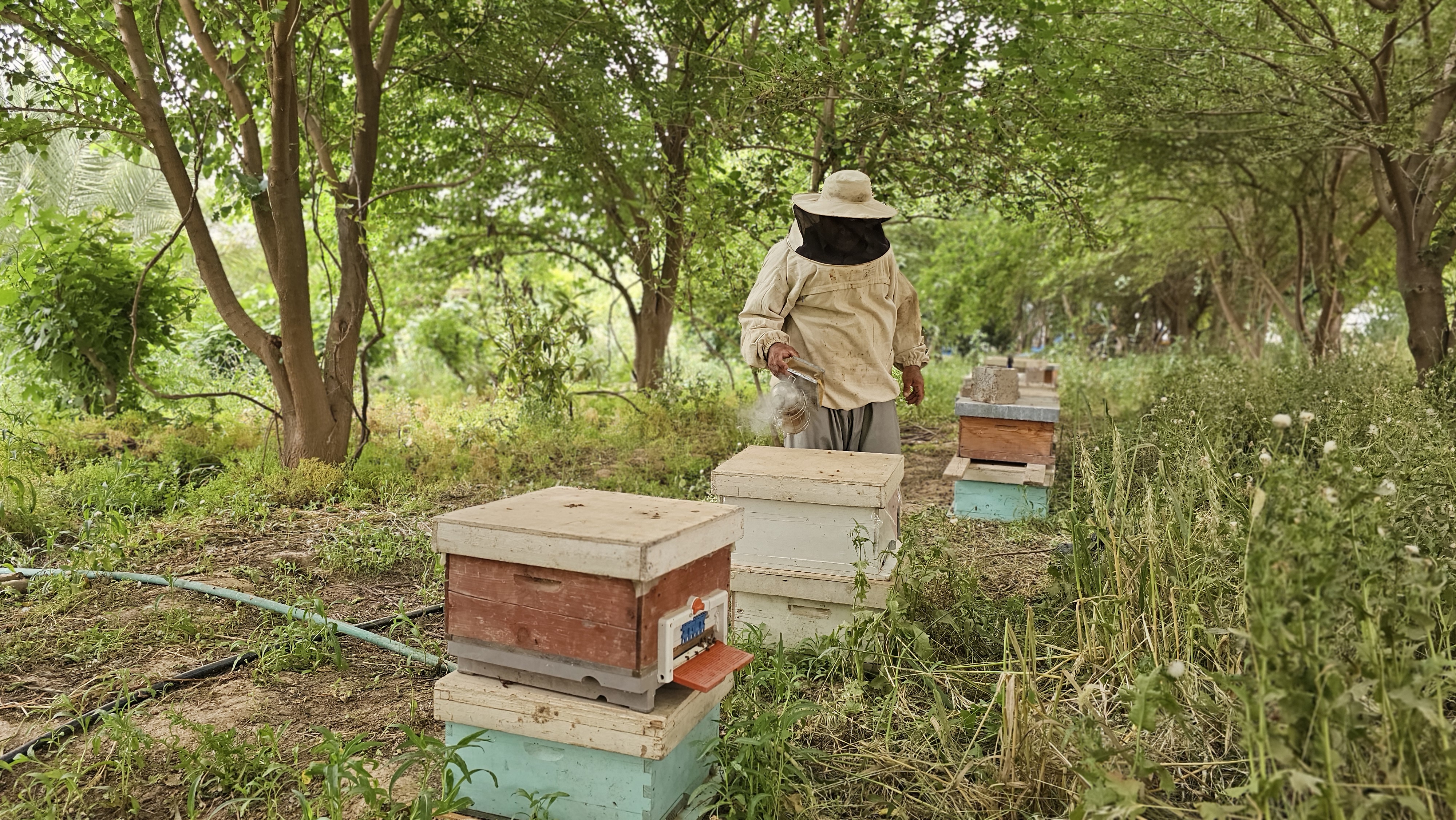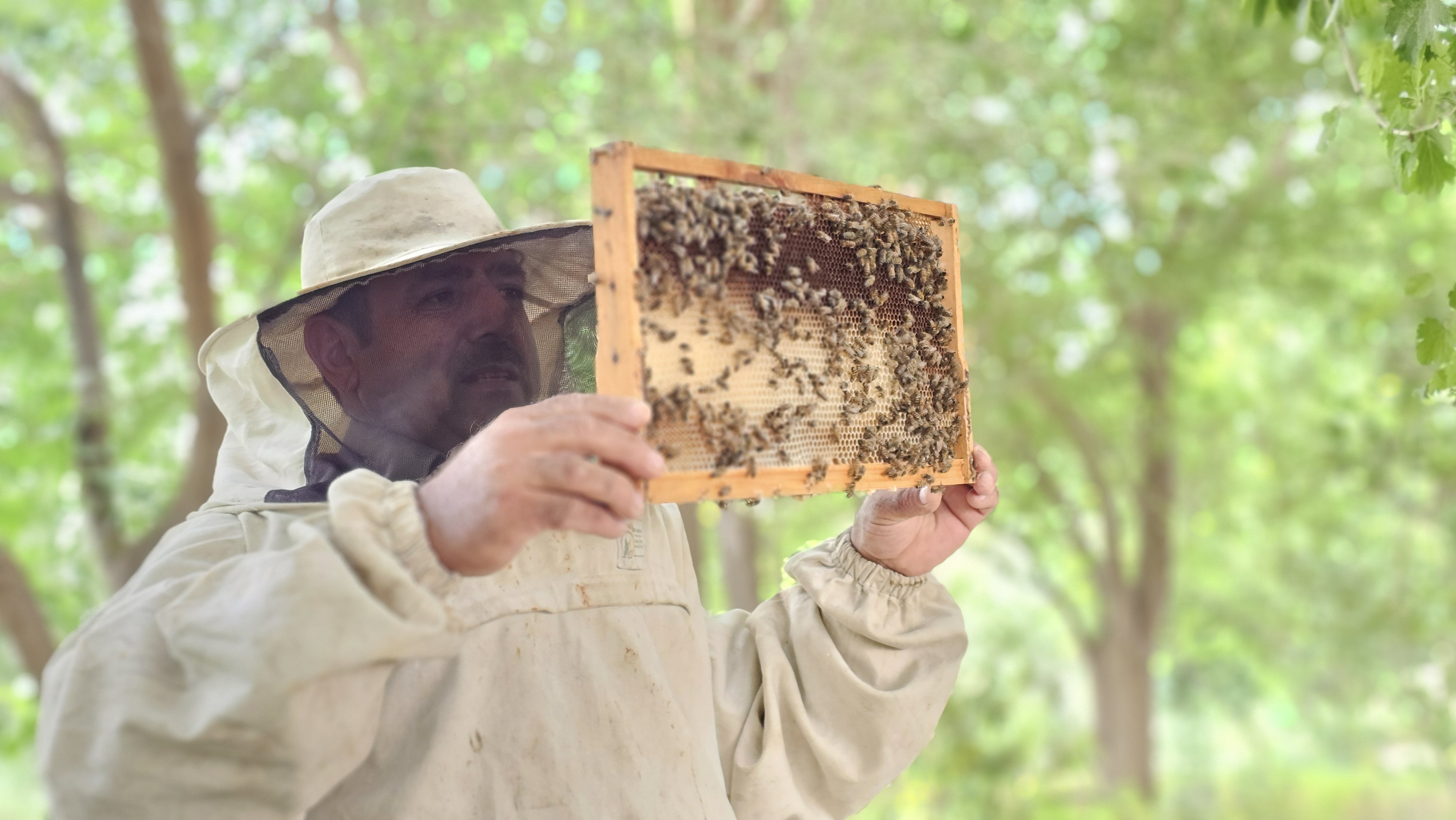
Saleh Mohammed's bees are facing a greater threat of extinction than ever before. Their primary food source is drying up due to the effects of climate change, causing them to lose immunity quickly and become easy prey for other insects.
Bees rely on flowering plants for food and energy, which provide essential protein and carbohydrates. Unfortunately, Garmian's flowers and greenery have suffered due to climate change, including low rainfall and drought.
"Climate change has caused significant damage to us in terms of bee population and production. Poultry and other animals like foxes, snails, and lizards prey on bees, reducing their numbers," said Saleh Mohammed Amin.
Amin, 48, has dedicated over half of his life to beekeeping and honey production. He owns the Shifa Beekeeping Project in Sayed Khalil village in the Kelar district of Garmian administration under Sulaymaniyah northern province.
The number of hives fluctuates between 100 and 300 annually, each containing 5,000 to 25,000 bees. Production varies by season, year, and climate, with Salih producing 0.5 to 1.5 tons of honey in his project.
"We set up 250 to 350 boxes each year, many of which are destroyed due to weather and disease," he added.
Most of the sectors in Garmian were affected by climate change, with beekeeping and honey production projects experiencing disease outbreaks, loss of food sources, and decreased production.
Iraq and the Kurdistan Region rank fifth globally in vulnerability to climate change, including drought.
Rahel Shukur Mahmoud, 32, owner of a natural beekeeping project in Barika village of Quratw sub-district, noted the fluctuating bee numbers, ranging from 250 to 350 boxes annually.
A significant portion is lost due to weather and disease
Rahel's project supports six families totaling 20 individuals, with 13 years of experience in the profession. The peak year was 2022, with each hive producing 10 to 15 kilograms of honey.
“Lately, each hive produced 2-3 KG due to climate change.”
Over 324 beekeepers are officially registered in Garmian, with 9,500 hives. Last year's honey production totaled 31.5 tons, according to Garmian agricultural statistics.

Garmian, 2025: Beekeepers suffer from climate change. Ziryan Mohammed
Nabaz Jahangir Rashid, head of the plant protection department at the Garmian General Directorate of Agriculture, explained how climate change directly impacts bees and honey production.
"Delayed rains last year washed away honey and seeds that bees rely on," he said.
The United Nations warns that climate change, particularly drought and rising temperatures, poses a significant threat to bees and honey production worldwide.
“Climate change has created a great threat to various ecosystems around the world, including bees,” Abdulmuttalib Rafaat, an expert in environmental management and water resources, told KirkukNow.
"It is the organisms that are most affected because they are necessary for fertilization and maintaining ecological balance.”
Due to rising temperatures in the world, the natural habitat of many animals, including bees, has changed, as Rafaat explained, bees grow under certain temperatures, when the temperature If it rises above its ideal range, the bees are in direct danger of extinction and will have to move to a more peaceful environment.
“This migration may reduce bee health and colony strength, while habitat loss due to climate change has reduced suitable nesting sites by 30 percent in some areas Abdulmuttalib, who is also a lecturer at Garmian University, said.
Climate change has reduced the availability of suitable nesting sites for bees by 30%
Beekeeping is a seasonal practice, with challenges arising from sudden weather changes. Bees require specific conditions to survive and produce honey, making them vulnerable to fluctuations in temperature.
Beekeepers face additional challenges from nearby agricultural chemicals, dust, and waste, which attract weak and disease-prone bees. Disease and other infections further threaten bee populations.
Beekeepers in Garmian sell high-quality honey for 40,000 to 60,000 Iraqi dinars IQD ($40) per kilo in the market. However, they lack government support for resources, medications, and protection against foreign honey smuggling.
Beekeepers face other challenges: nearby agricultural land filled with harmful chemicals to repel insects, and accumulated dust and waste from semi-urban communities attract bees that are weak and disease-resistant.
Rahel said a big number of bees are killed every year due to the use of pesticides, in addition to the spread of Varroa destructor disease, which has increased in recent years, along with other diseases such as Sporine, Acarine and Nosema "
It is not provided, especially for Varroa disease, which is a very common parasite that lives on bees.

"The government has not helped us in terms of materials, medicines, supplies, prevention of smuggling of foreign honey and the failure of local products, only helped in providing agricultural guidance," Shukur said.
He also complained, “The government has not helped us,” while we have to pay 250,000 dinars annually to renew their project licenses. In addition, they have appointed agricultural supervisors who visit their projects once a week. The government is doing it to us.”
Since 2014, we have not been able to provide any assistance to the beekeepers due to the financial crisis
There are over 8,000 beekeepers in the Kurdistan Region of Iraq KRI, with a total of 350,000 hives, according to statistics from the Kurdistan Regional Government KRG.
Ismail Mohammed, director of the agricultural services department of Garmian Agriculture told Kirkuk Now, “Since 2014, we have not been able to provide any assistance to beekeepers due to the financial crisis.
“We only support the beekeepers by asking the security checkpoints allow them to take their bees to the other cities.”
The annual honey production in the Kurdistan Region is between 550 to 650 tons, while the domestic demand is more than 2,000 tons. The KRG decided to export honey several years ago.
Nabaz Jahangir admits that they as Garmian agriculture and the government in general have not provided any assistance to beekeepers due to the financial crisis, because they did not have the budget to provide medicines and supplies.